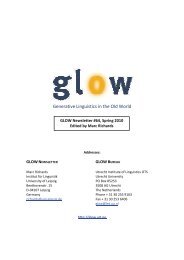Reflexivity without reflexivesEric Reuland, Anna Volkova 1Utrecht <strong>in</strong>stitute of <strong>L<strong>in</strong>guistics</strong> OTS, Universiteit UtrechtBackground: What prevents pronom<strong>in</strong>als from be<strong>in</strong>g locally bound? Does this a) reflect an<strong>in</strong>tr<strong>in</strong>sic property of pronom<strong>in</strong>als (Chomsky 1981), is it b) a relative (economy) effect, thatonly shows up where <strong>the</strong>re is a more dedicated competitor (see from different perspectives,Safir 2004, Boeckx, Hornste<strong>in</strong> and Nunes 2007, Lev<strong>in</strong>son 2000), does it c) have a semanticbasis as <strong>in</strong> Schlenker (2005), or does it d) follow from general conditions on agree basedcha<strong>in</strong>s, and reflexive predicates (Reuland 2011)? To resolve this issue, it is important to studylanguages that are reported to allow locally bound pronom<strong>in</strong>als, and assess whe<strong>the</strong>r <strong>the</strong>y <strong>in</strong>fact do have <strong>the</strong>m, and, which factors come <strong>in</strong>to play when local b<strong>in</strong>d<strong>in</strong>g obta<strong>in</strong>s. Khanty(Uralic, spoken <strong>in</strong> Northwest Siberia) is such a language (Nikolaeva 1995). In this talk wereview data collected on a field trip <strong>in</strong> July 2012, and show that <strong>the</strong>se support option d).A first set of facts and <strong>the</strong>ir consequences: łuveł <strong>in</strong> object position can be bound by a coargumentsubject. It can also receive a value from discourse, show<strong>in</strong>g that łuveł is a truepronom<strong>in</strong>al (1a). (1b) with a quantificational antecedent shows that <strong>the</strong> local dependency isone of b<strong>in</strong>d<strong>in</strong>g, not coreference.(1) a. UtltiteXo i łuveł i/k išəәk-s-əәłłe.teacher he.ACC praise-PST-SG.3SG The teacher praised him(self).b. NemXojat i łuveł i/k ănt išəәk-ł-əәłłe.no.one he.ACC NEG praise-NPST-SG.3SG No one praises himself / him.This fact rules out both <strong>the</strong> approaches <strong>in</strong> a) and c). But it is compatible with <strong>the</strong> approaches<strong>in</strong> b) – <strong>the</strong>re is no competitor – and prima facie problematic for <strong>the</strong> approach <strong>in</strong> d). IfnemXojat ‘no one’ b<strong>in</strong>ds łuveł ‘him’, this is potentially a violation of <strong>the</strong> cha<strong>in</strong> condition <strong>in</strong>Reuland (2011) s<strong>in</strong>ce łuveł is fully specified for phi-features. Fur<strong>the</strong>rmore, this approachfaces <strong>the</strong> fact that logical syntax representations as <strong>in</strong> (2) with two identical variables <strong>in</strong> <strong>the</strong>coargument doma<strong>in</strong> are ruled out (Reuland 2011).(2) *DP (V x x)A second set of facts and <strong>the</strong>ir consequences: i) Khanty has two types of verbal agreement:obligatory subject agreement and optional object agreement (OAgr), as illustrated <strong>in</strong> (3).(3) UtltiteXo poXlen’ki išəәk-s-əәłłe / išəәk-s.teacher boy praise-PST-SG.3SG / praise-PST.3SG The teacher praised <strong>the</strong> boy.The follow<strong>in</strong>g condition applies: a personal pronoun can be locally bound – yield<strong>in</strong>g areflexive predicate – only if <strong>the</strong> verb carries object agreement, cf. <strong>the</strong> ill-formedness of (4).(4) *UtltiteXo i łuveł i išəәk-s.teacher he.ACC praise-PST.3SG The teacher praised him / *himself.ii) The presence of object agreement facilitates object drop, as <strong>in</strong> (5).(5) TămXătł ma c’ăta van-s-em.today I <strong>the</strong>re see-PST-SG.1SG{LC: Yesterday my son went to Beryozovo.} Today I saw (him /*myself) <strong>the</strong>re.But a zero object is <strong>in</strong>compatible with local b<strong>in</strong>d<strong>in</strong>g. The predicate <strong>in</strong> (5) cannot be<strong>in</strong>terpreted as reflexive.These facts are <strong>in</strong>compatible with any straightforward version of <strong>the</strong> no-competitorapproaches <strong>in</strong> b). That is, even with object agreement <strong>the</strong> pronoun “is” not a reflexive;noth<strong>in</strong>g <strong>in</strong> <strong>the</strong> competition <strong>the</strong>ories would lead us to expect that łuveł + OAgr would be aw<strong>in</strong>ner aga<strong>in</strong>st bare łuveł or bare OAgr (assum<strong>in</strong>g we can compare <strong>the</strong>m, although <strong>the</strong>y reflectdifferent numerations). How does option d) fare?1 The authors are listed alphabetically.
Analysis: The object agreement marker occupies a position after <strong>the</strong> tense marker, preced<strong>in</strong>g<strong>the</strong> subject agreement marker (table 2). Thus, given Baker’s Mirror Pr<strong>in</strong>ciple subjectagreement is higher on <strong>the</strong> verbal sp<strong>in</strong>e than object agreement. Assum<strong>in</strong>g agree-based cha<strong>in</strong>s(Pesetsky and Torrego 2004, implemented as <strong>in</strong> Reuland 2011) object agreement will block<strong>the</strong> formation of a syntactic dependency between <strong>the</strong> T-system and <strong>the</strong> object pronoun bym<strong>in</strong>imality. At <strong>the</strong> stage when subject agreement comes <strong>in</strong>to play object agreement willalready have checked any syntactic property of pronoun (e.g. structural Case) that wouldmake it visible for prob<strong>in</strong>g. Thus, <strong>the</strong> pre-conditions for <strong>the</strong> formation of a cha<strong>in</strong> – whichwould be ill-formed – are not met. Hence, cancellation of <strong>the</strong> derivation does not ensue(Chomsky 1995, Reuland 2011) and <strong>the</strong> pronoun can be variable bound at <strong>the</strong> C-I <strong>in</strong>terface.The second issue is <strong>the</strong> prohibition <strong>in</strong> (2). Object drop <strong>in</strong> isolation does not license reflexivity(see (5)). In order to avoid <strong>the</strong> configuration <strong>in</strong> (2), <strong>the</strong> object argument should be complex. Itis, s<strong>in</strong>ce OAgr licenses a null object. Overt łuveł forms a constituent with <strong>the</strong> null object. Thisanalysis is fur<strong>the</strong>r supported s<strong>in</strong>ce łuveł is also used as an <strong>in</strong>tensifier (note that <strong>in</strong> this capacityit cannot be null):(6) Jełp škola puš-s-əә(t) Komarova łuv joXt-əәs.new school open-PST-3PL Komarova he come-PST.3SGKomarova {<strong>the</strong> governor} herself came for <strong>the</strong> open<strong>in</strong>g of <strong>the</strong> new school.Thus, <strong>the</strong> structure of (1) under its reflexive <strong>in</strong>terpretation is (7), with ∅ licensed by OAgr.(7) UtltiteXo i [łuveł i ∅] išəәk-s-əәlle.teacher he.ACC ∅ praise-PST-SG.3SG The teacher praised himself.Conclusion: We tested various current approaches to b<strong>in</strong>d<strong>in</strong>g aga<strong>in</strong>st <strong>the</strong> facts from Khanty.It turns out that only an approach as <strong>in</strong> d) can adequately account to <strong>the</strong> use of locally boundpersonal pronouns <strong>in</strong> Khanty. The key factor here is object agreement: it prevents <strong>the</strong>configuration for cha<strong>in</strong>-formation and licenses a complex structure to avoid identicalvariables <strong>in</strong> a local doma<strong>in</strong>.ReferencesBoeckx, C., N. Hornste<strong>in</strong>, and J. Nunes (2007). Overt copies <strong>in</strong> reflexive and controlstructures: A movement analysis. In University of Maryland Work<strong>in</strong>g Papers <strong>in</strong> <strong>L<strong>in</strong>guistics</strong>,15:1–46. Chomsky, N. (1981). Government and b<strong>in</strong>d<strong>in</strong>g. Foris. Lev<strong>in</strong>son, S. (2000).Presumptive mean<strong>in</strong>gs: The <strong>the</strong>ory of generalized conversational implicature. MIT Press.Nikolaeva, I. (1995). Obdorskij dialekt chantyjskogo jazyka (The Obdorsk dialect of Ostyak)[<strong>in</strong> Russian]. Hamburg. Pesetsky, D. and Torrego, E. (2004). Tense, case, and <strong>the</strong> nature ofsyntactic categories. In Gueron, J. and Lecarme, J. (eds.), The Syntax of Time. MIT Press.Re<strong>in</strong>hart, T. and Reuland, E. (1993). Reflexivity. L<strong>in</strong>guistic <strong>in</strong>quiry, 24(4): 657–720.
- Page 1 and 2:
GLOW Newsletter #70, Spring 2013Edi
- Page 3 and 4:
INTRODUCTIONWelcome to the 70 th GL
- Page 5:
Welcome to GLOW 36, Lund!The 36th G
- Page 8 and 9:
REIMBURSEMENT AND WAIVERSThe regist
- Page 10 and 11:
STATISTICS BY COUNTRYCountry Author
- Page 12 and 13:
15:45-16:00 Coffee break16:00-17:00
- Page 14 and 15:
14:00-15:00 Adam Albright (MIT) and
- Page 16 and 17:
17:00-17:30 Anna Maria Di Sciullo (
- Page 18 and 19:
16.10-16.50 Peter Svenonius (Univer
- Page 20 and 21:
GLOW 36 WORKSHOP PROGRAM IV:Acquisi
- Page 22 and 23:
The impossible chaos: When the mind
- Page 24 and 25:
17. Friederici, A. D., Trends Cogn.
- Page 26 and 27:
Second, tests replicated from Bruen
- Page 28 and 29:
clusters is reported to be preferre
- Page 30 and 31:
occur (cf. figure 1). Similar perfo
- Page 32 and 33:
argument that raises to pre-verbal
- Page 34 and 35:
Timothy Bazalgette University of
- Page 36 and 37:
. I hurt not this knee now (Emma 2;
- Page 38 and 39:
Rajesh Bhatt & Stefan Keine(Univers
- Page 40 and 41:
SIZE MATTERS: ON DIACHRONIC STABILI
- Page 42 and 43:
ON THE ‘MAFIOSO EFFECT’ IN GRAM
- Page 44 and 45:
The absence of coreferential subjec
- Page 46 and 47:
PROSPECTS FOR A COMPARATIVE BIOLING
- Page 48 and 49:
A multi-step algorithm for serial o
- Page 50 and 51:
Velar/coronal asymmetry in phonemic
- Page 52 and 53:
On the bilingual acquisition of Ita
- Page 54 and 55:
Hierarchy and Recursion in the Brai
- Page 56 and 57:
Colorful spleeny ideas speak furiou
- Page 58 and 59:
A neoparametric approach to variati
- Page 60 and 61:
Lexical items merged in functional
- Page 62 and 63:
Setting the elements of syntactic v
- Page 64 and 65:
Language Faculty, Complexity Reduct
- Page 66 and 67:
Don’t scope your universal quanti
- Page 68 and 69:
Restricting language change through
- Page 70 and 71:
4. Conclusion This micro-comparativ
- Page 72 and 73:
2. Central Algonquian feature hiera
- Page 74 and 75:
availability of the SR reading in (
- Page 76 and 77:
Repairing Final-Over-Final Constrai
- Page 78 and 79:
a PF interface phenomenon as propos
- Page 80 and 81:
(b) Once the learner has determined
- Page 82 and 83:
cognitive recursion (including Merg
- Page 84 and 85:
can be null, or lexically realized,
- Page 86 and 87:
feature on C and applies after Agre
- Page 88 and 89:
Nobu Goto (Mie University)Deletion
- Page 90 and 91:
Structural Asymmetries - The View f
- Page 92 and 93:
FROM INFANT POINTING TO THE PHASE:
- Page 94 and 95:
Some Maladaptive Traits of Natural
- Page 96 and 97:
Constraints on Concept FormationDan
- Page 98 and 99:
More on strategies of relativizatio
- Page 100 and 101: ReferencesBayer, J. 1984. COMP in B
- Page 102 and 103: Improper movement and improper agre
- Page 104 and 105: Importantly, while there are plausi
- Page 106 and 107: This hypothesis makes two predictio
- Page 108 and 109: (3) a. Það finnst alltaf þremur
- Page 110 and 111: (2) Watashi-wa hudan hougaku -wa /*
- Page 112 and 113: However when the VP (or IP) is elid
- Page 114 and 115: More specifically, this work reflec
- Page 116 and 117: modality, or ii) see phonology as m
- Page 118 and 119: (I) FWHA The wh-word shenme ‘what
- Page 120 and 121: 1The historical reality of biolingu
- Page 122 and 123: Rita Manzini, FirenzeVariation and
- Page 124 and 125: Non-counterfactual past subjunctive
- Page 126 and 127: THE GRAMMAR OF THE ESSENTIAL INDEXI
- Page 128 and 129: Motivating head movement: The case
- Page 130 and 131: Limits on Noun-suppletionBeata Mosk
- Page 132 and 133: Unbounded Successive-Cyclic Rightwa
- Page 134 and 135: Same, different, other, and the his
- Page 136 and 137: Selectivity in L3 transfer: effects
- Page 138 and 139: Anaphoric dependencies in real time
- Page 140 and 141: Constraining Local Dislocation dial
- Page 142 and 143: A Dual-Source Analysis of GappingDa
- Page 144 and 145: [9] S. Repp. ¬ (A& B). Gapping, ne
- Page 146 and 147: of Paths into P path and P place is
- Page 148 and 149: Deriving the Functional HierarchyGi
- Page 152 and 153: Reuland, E. (2001). Primitives of b
- Page 154 and 155: on v, one associated with uϕ and t
- Page 156 and 157: Merge when applied to the SM interf
- Page 158 and 159: 1 SachsThe Semantics of Hindi Multi
- Page 160 and 161: Covert without overt: QR for moveme
- Page 162 and 163: Morpho-syntactic transfer in L3 acq
- Page 164 and 165: one where goals receive a theta-rel
- Page 166 and 167: 51525354555657585960616263646566676
- Page 168 and 169: follow Harris in assuming a ranked
- Page 170 and 171: changing instances of nodes 7 and 8
- Page 172 and 173: Sam Steddy, steddy@mit.eduMore irre
- Page 174 and 175: Fleshing out this model further, I
- Page 176 and 177: (5) Raman i [ CP taan {i,∗j}Raman
- Page 178 and 179: properties with Appl (introduces an
- Page 180 and 181: econstruct to position A then we ca
- Page 182 and 183: (5) Kutik=i ez guret-a.dog=OBL.M 1S
- Page 184 and 185: sults summarized in (2) suggest tha
- Page 186 and 187: Building on Bhatt’s (2005) analys
- Page 188 and 189: Underlying (derived from ON) /pp, t
- Page 190 and 191: out, as shown in (3) (that the DP i
- Page 192 and 193: Word order and definiteness in the
- Page 194 and 195: Visser’s Generalization and the c
- Page 196 and 197: the key factors. The combination of
- Page 198 and 199: Parasitic Gaps Licensed by Elided S
- Page 200 and 201:
Stages of grammaticalization of the





